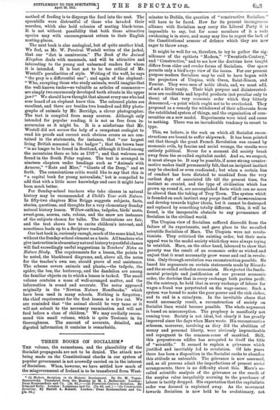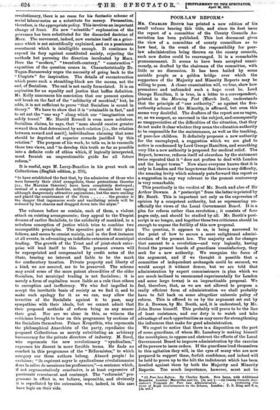THREE BOOKS ON SOCIALISM.* THE volume, the earnestness, and the
plausibility of the Socialist propaganda are not to be denied. The attack now being made on the Constitutional checks in our system of popular government is not avowedly carried on in the interest of Socialism. When, however, we have settled how much of the misgovernment of Ireland is to be transferred from West-
• (1) Modern Socialism in its Historic Development. By Dr. M. Tugan- Raranowsky. Translated from the Russian by M. I. Bedmount. London : Swan Sonnenschein and Co. [3s. 6d.]—(2) Twentieth-Century Socialism. By Edmond Kelly. London : Longmana and Co. [7s. 6d. uet.]—(3) Constructive Socialism. By Harold A. Russell. London; Swan Sonnenschein and Co. pa. 6d.]
minster to Dublin, the question of " constructive Socialism " will have to be faced. How far its present incongruous alliance with Socialism may carry the Liberal Party it is impossible to say, but for some members of it a rude awakening is in store, and many may live to regret the lack of the Constitutional armour of defence which they are now eager to throw away.
It might be well for us, therefore, to try to gather the sig- nificance of the epithets "Modern," "Twentieth-Century," and "Constructive," and to see how the doctrine here taught differs from older and cruder forms of Socialism. Our space permits only a bird's-eye view of the issues. For our present purpose modern Socialism may be said to have begun with the projectors of Utopias, with Owen, Saint-Simon, and Fourier. They were men of noble ideals, and, we must add, of not a little vanity. Their high purpose and disinterested- ness are creditable and hopeful products (not peculiar only to them) of that very economic order which they bitterly denounced,—a point which ought not to be overlooked. They proposed as a remedy the withdrawal of their adherents from the established system of things, and the organisation of com- munities on a new model. Experiments were tried and came
to nothing. There was an ineradicable tendency to revert to type.
This, we believe, is the rock on which all Socialist recon- structions are bound to suffer shipwreck. It has been pointed out that though the great French Revolution was caused by economic evils, by famine and social wrongs, the results were entirely political. Never for a moment did society break away from the so-called capitalist model. And so, we suspect, it must always be. It may be possible, if some strong counter- motive makes itself permanently felt, that an incipient instinct may be checked or even eradicated ; but when a certain line of conduct has been dictated to mankind from the very earliest days of associated life till the present time, the instinct so created, and the type of civilisation which has grown up round it, are accomplished facts which can no more be altered than the taking of Troy Town. The system which is founded on swill instinct may purge itself of incenveniencea and develop towards higher ideals, but it cannot be destroyed and replaced by something totally different. This, it will be found, is the insuperable obstacle to any permanence of Socialism in the civilised world.
The Utopian view of Socialism suffered discredit from the failure of its experiments, and gave place to the so-called scientific Socialism of Marx. The Utopists were not revolu- tionists. They criticised the existing order, but their main appeal was to the model society which they were always trying to establish. Marx, on the other hand, laboured to show that poverty was the result of an economic order so wicked and unjust that it must necessarily grow worse and end in revolu- tion. Only through revolution was reconstruction possible. He based his arguments on certain statements made by Ricarch and the so-called orthodox economists. He rejected the funda- mental principle and justification of our present economic order, the doctrine that in every exchange both parties profit. On the contrary, he held that in every exchange of labour for wages a fraud was perpetrated on the wage-earner. Such a system was bound to make the poor poorer and the rich richer, and to end in a cataclysm. In the inevitable chaos that would necessarily result, a reconstruction of society on Socialist lines would become possible. The whole argument is based on misconception. The prophecy is manifestly not coming true. Society is not ideal, but clearly it has greatly improved since the days when Marx wrote. His reconstructive schemes, moreover, involving as they did the abolition of money and personal liberty, were obviously impracticable and repugnant to the common-sense of mankind. Still, this preposterous edifice has arrogated to itself the title of "scientific." It seemed to explain a grievance which justified and inevitably led to revolution. Of late years there has been a disposition in the Socialist ranks to abandon this attitude as untenable. The grievance is now assumed, and, as all persons admit the imperfections of present social arrangements, there is no difficulty about this. Marx's so- called scientific analysis of the grievance as the result of the surplus value inequitably accruing to the purchaser of labour is tacitly dropped. His expectation that the capitalistic order was doomed is explained away. As the movement towards Socialism is now held to be evolutionary, not revolutionary, there is no room for his fantastic scheme of social labour-notes as a substitute for money. Permeation, therefore, is the appropriate policy. This involves an important change of front. No new " scientific " explanation of the grievance has been substituted for the discarded doctrine of
Marx. The movement, indeed, now sustains itself on a griev- ance which is not scientifically explained, and on a passionate resentment which is intelligible enough. It continues to expend its fury against constituted society, rejecting the methods but pursuing the direction inculcated by Marx.
Here the " modern," " twentieth-century," " constructive " exposition of the question comes in. Characteristically Dr. Tugan-Baranowsky urges the necessity of going back to the " Utopists " for inspiration. The details of reconstruction which prove such a stumbling-block are the means, not the end, of Socialism. The end is not easily formulated. It is an aspiration for an equality and justice that baffles definition. Mr. Kelly announces his conviction that our present system
will break on the fact of the "solidarity of mankind," but, he adds, it is not sufficient to prove "that Socialism is sound in
theory." We have to show that it is "attainable in fact," and to set out the "one way" along which our "imagination can safely travel." Mr. Harold Russell is even more nebulous. Socialism claims, he says, that "none should receive greater
reward than that determined by such relation [i.e., the relation between reward and merit], individualism claiming that none
should be deprived of superior rewards justified by this relation." The purpose of his work, he tells us, is to reconcile these two views, and " to develop this truth so far as possible into a definite code of ethics which, if logically interpreted, must furnish an unquestionable guide for all future reform."
It is useful, says M. Leroy-Beaulieu in his great work on Collectivism (English edition, p. 276),
" to have established the fact that, by the admission of those who were formerly their chief evangelists, those pretentious theories [i.e., the Marxian theories] have been completely destroyed; instead of a compact doctrine, nothing now remains but vague although dangerously attractive aspirations; but the more smiling and placid the countenance of the Siren the greater is the danger that ingenuous souls and vacillating minds will be seduced by her charms and dragged down into the abyss."
The volumes before us contain, each of them, a violent attack on existing arrangements ; they appeal to the Utopist dreams of earlier Socialists, to the solidarity of mankind, to a nebulous conception of justice which tries to combine two incompatible principles. The operative part of their plan follows, and seems to consist mainly, and in the first instance at all events, in advocating an indefinite extension of municipal trading. The growth of the Trust and of joint-stock enter- prise will lend itself to this. The present owners will be expropriated and compensated by credit notes of the State, bearing no interest and liable to be the mark for confiscatory taxation. Private property and liberty of a kind, we are assured, are to be preserved. The scheme may avoid some of the more patent absurdities of the older Socialism, but municipal trading is not Socialism ; it is merely a form of capitalism more liable as a rule than others to corruption and inefficiency. We who feel impelled to accept the inevitable basis of society as we find it, and to make such apology for it as we can, may allow the invective of the Socialists against it to pass, may sympathise with their ideals, but we cannot admit that their proposed methods of reform bring us any nearer their goal. Nor are we alone in this, as witness the criticisms brought to bear on this programme by sections of the Socialists themselves. Prince Kropotkin, who represents
the philosophical Anarchists of the party, repudiates the proposed Collectivism as merely substituting an arbitrary bureaucracy for the private directors of industry. M. Sorel, who represents the new revolutionary " syndicalism,"
expresses his dissent in more forcible terms. He finds no comfort in this programme of the " Reformistes," to which category our three authors belong. Absurd people he exclaims ; " ils espd rent noyer le syndicalisme revolutionnaire dims is salive de messieurs les professeurs,"—a sentence which, if not argumentatively conclusive, is at least expressive of passionate resentment and contempt. The "reformist" pro- gramme in effect is, we believe, impossible, and obviously it is repudiated by the extremists, who, indeed, in this case have logic on their side.



























































 Previous page
Previous page